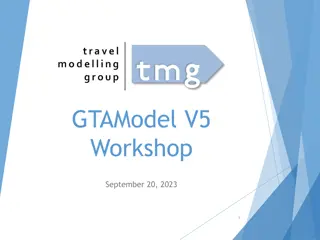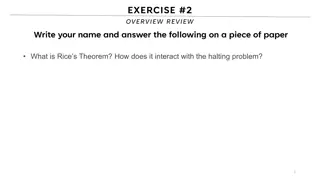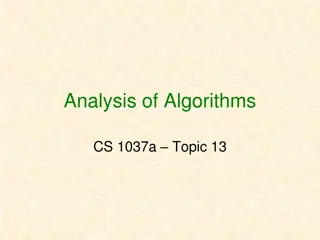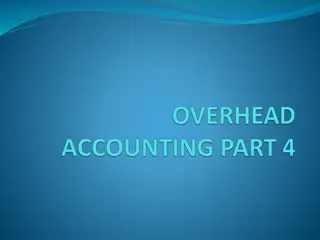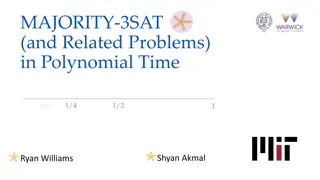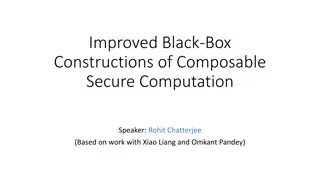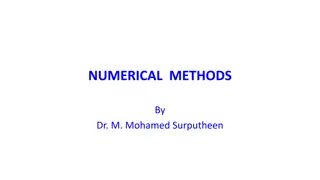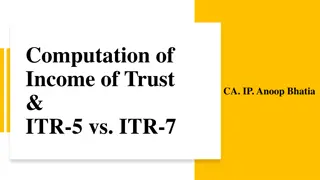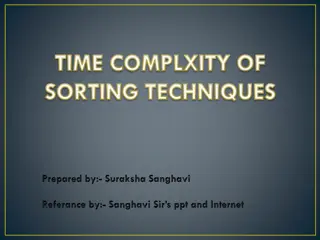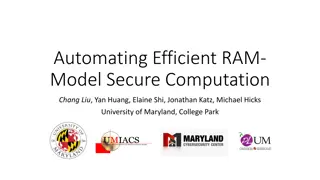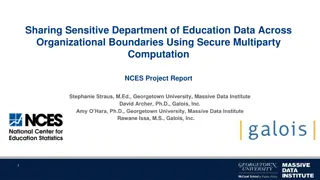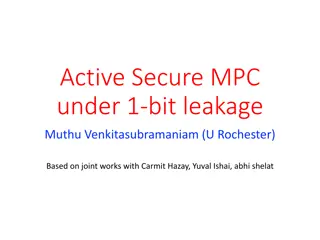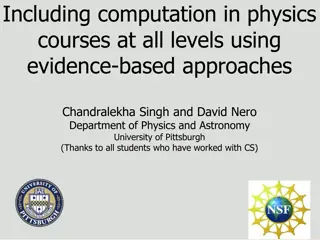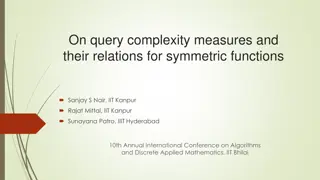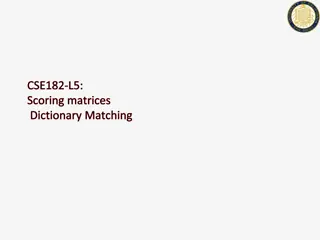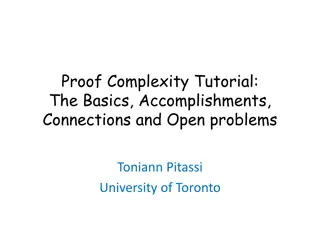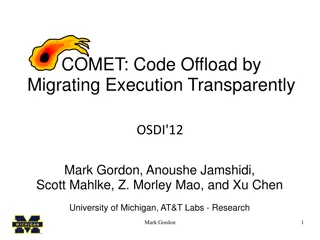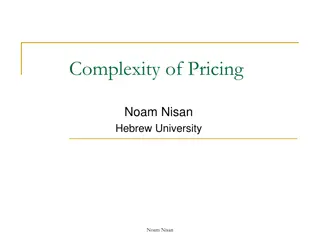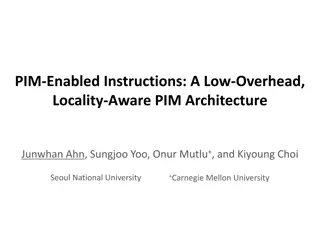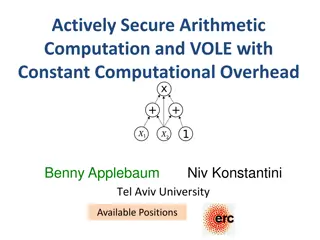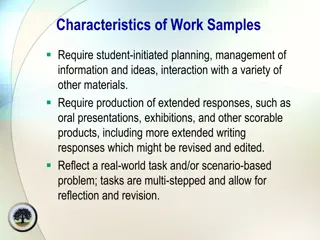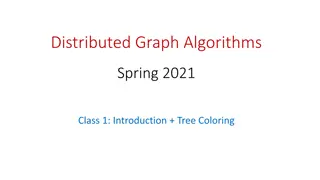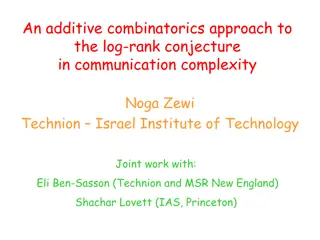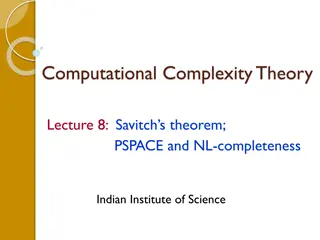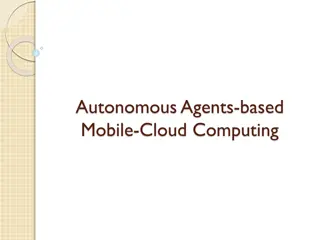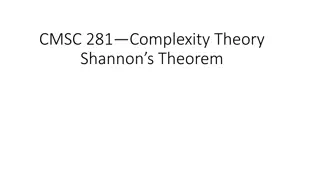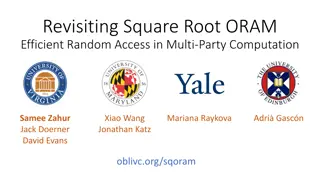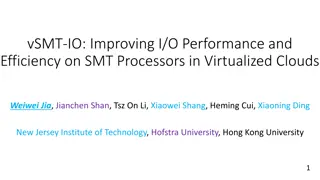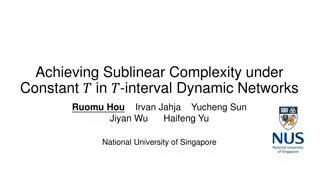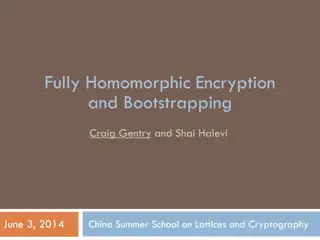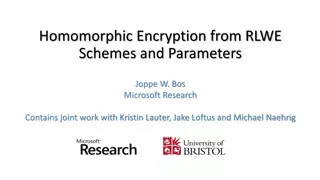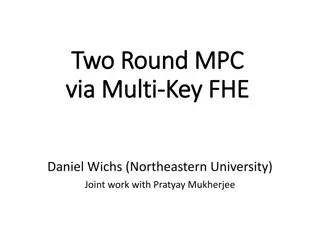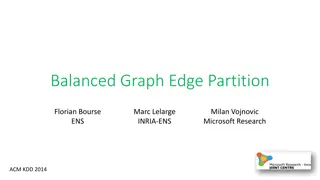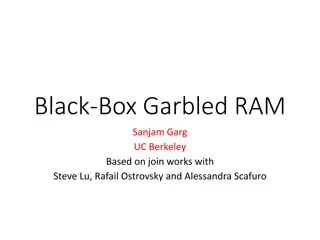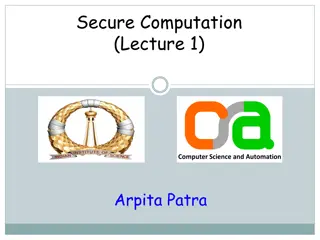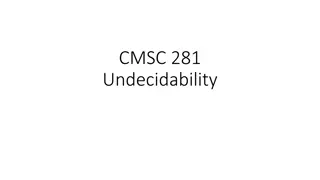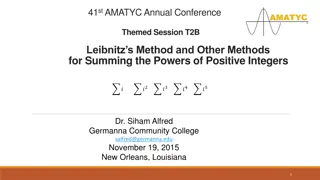Exploring Complexity and Complicatedness in Travel Demand Modeling Systems
Delve into the intricate world of travel demand modeling systems, where complexity arises from dynamic feedback, stochastic effects, uncertainty, and system structure. Discover the balance needed to minimize complicatedness while maximizing behavioral complexity in regional travel modeling. Uncover
0 views • 42 slides
Computability: Exploring Theoretical Limits of Computation
Delve into computability theory, focusing on what is computable and the limits of computation. Explore concepts like Rice's Theorem, the Halting Problem, and classes of expressiveness in computability theory, such as combinational logic, finite-state machines, pushdown automata, and Turing machines.
5 views • 43 slides
Overview of Distributed Systems: Characteristics, Classification, Computation, Communication, and Fault Models
Characterizing Distributed Systems: Multiple autonomous computers with CPUs, memory, storage, and I/O paths, interconnected geographically, shared state, global invariants. Classifying Distributed Systems: Based on synchrony, communication medium, fault models like crash and Byzantine failures. Comp
9 views • 126 slides
Understanding Time Complexity in Algorithm Analysis
Explore the concept of time complexity in algorithm analysis, focusing on the efficiency of algorithms measured in terms of execution time and memory usage. Learn about different complexities such as constant time, linear, logarithmic, and exponential, as well as the importance of time complexity co
0 views • 73 slides
Computation of Machine Hour Rate: Understanding MHR and Overhead Rates
Computation of Machine Hour Rate (MHR) involves determining the overhead cost of running a machine for one hour. The process includes dividing overheads into fixed and variable categories, calculating fixed overhead hourly rates, computing variable overhead rates, and summing up both for the final M
4 views • 18 slides
Understanding Complexity in Polynomial Time: MAJORITY-3SAT and Related Problems
Dive into the world of MAJORITY-3SAT and its related problems, exploring the complexity of CNF formulas and the satisfiability of assignments. Discover the intricacies of solving canonical NP-complete problems and the significance of variables in determining computational complexity.
3 views • 35 slides
Enhanced Security in Multiparty Computation
Explore the improved black-box constructions of composable secure computation, focusing on definitions, objectives, and the formalization basics of multiparty computation (MPC). Learn about the motivating security aspects in MPC and the real/ideal paradigm. Discover how MPC security involves compari
1 views • 68 slides
Understanding Numerical Methods and Errors in Computation
Delve into the world of numerical methods through the guidance of Dr. M. Mohamed Surputheen. Explore topics such as solving algebraic and transcendental equations, simultaneous linear algebraic equations, interpolation, numerical integration, and solving ordinary differential equations. Learn about
0 views • 130 slides
Trust Income Computation and Application Guidelines
Learn about income computation of trusts using ITR-5 vs. ITR-7, types of institutions, components of income, application of income, and important guidelines including amendments by FA2022 for charitable and religious trusts.
0 views • 47 slides
Sorting Techniques: Complexity, Stability, and Cases
This content discusses various sorting techniques, their time complexity in worst, best, and average cases, stability, and types of sorts. It includes a comparison table listing algorithms such as Bubble Sort, Selection Sort, Insertion Sort, Quick Sort, and more, along with their respective complexi
0 views • 10 slides
Secure Computation Techniques in RAM Models with Efficient Automation
Explore the automation of efficient RAM-model secure computation techniques, including examples such as secure binary search. Discover how traditional solutions using circuit abstractions can be improved for sub-linear time computation through methods like Oblivious RAM. Learn about techniques such
0 views • 37 slides
Secure Multiparty Computation for Department of Education Data Sharing
This report discusses the use of Secure Multiparty Computation (SMC) to enable sharing of sensitive Department of Education data across organizational boundaries. The application of SMC allows for joint computation while keeping individual data encrypted, ensuring privacy and security within the Nat
0 views • 15 slides
Advancements in Active Secure Multiparty Computation (MPC)
Delve into the realm of secure multiparty computation under 1-bit leakage, exploring the intersection of DP algorithms, MPC, and the utilization of leakage for enhanced performance. Discover the overhead implications of achieving active security, as well as the evolution of secure computation protoc
0 views • 43 slides
Enhancing Computation in Physics Education Using Cognitive Approaches
Utilizing evidence-based methods, this study explores incorporating computation in physics courses, focusing on instructional design, student knowledge states, and preparation for future learning. It discusses common conceptual difficulties in quantum mechanics and proposes cognitive theory-based st
0 views • 24 slides
Exploring Complexity in Computational Theory
Dive into a world of computational complexity and theory with a focus on topics such as NP, P, PH, PSPACE, NL, L, random vs. deterministic algorithms, and the interplay of time and space complexity. Discover insights on lower bounds, randomness, expanders, noise removal, and the intriguing question
0 views • 17 slides
Quantum Query Complexity Measures for Symmetric Functions
Explore the relationships between query complexity measures, including quantum query complexity, adversary bounds, and spectral sensitivity, in the context of symmetric functions. Analysis includes sensitivity graphs, the quantum query model, and approximate counting methods. Results cover spectral
0 views • 19 slides
Secure Multiparty Computation: Enhancing Privacy in Data Sharing
Secure multiparty computation (SMC) enables parties with private inputs to compute joint functions without revealing individual data, ensuring privacy and correctness. This involves computations on encrypted data using techniques like homomorphic encryption for scenarios like e-voting. SMC serves as
2 views • 27 slides
Understanding Sequence Alignment and Scoring Matrices
In this content, we dive into the fundamentals of sequence alignment, Opt score computation, reconstructing alignments, local alignments, affine gap costs, space-saving measures, and scoring matrices for DNA and protein sequences. We explore the Smith-Waterman algorithm (SW) for local sequence align
0 views • 26 slides
Exploring Proof Complexity: The Basics, Achievements, and Challenges
Delve into the intricacies of proof complexity, covering propositional, algebraic, and semi-algebraic proof systems, lower bound methods, and algorithmic implications. Discover fundamental connections to complexity theory and open problems in the field.
0 views • 76 slides
COMET: Code Offload by Migrating Execution - OSDI'12 Summary
The research paper discusses COMET, a system for transparently offloading computation from mobile devices to network resources to improve performance. It outlines the goals of COMET, its design, and evaluation, focusing on distributed shared memory and bridging computation disparity through offloadi
0 views • 31 slides
Complexity of Pricing and Auctions in Economic Sciences
Explore the research work by Noam Nisan from Hebrew University on the complexity of pricing and auctions in economic sciences. The content covers various topics such as optimization, ad auctions, spectrum auctions, cloud computing, and strategies for maximizing revenue in selling independent items.
5 views • 40 slides
Exploring Challenges and Opportunities in Processing-in-Memory Architecture
PIM technology aims to enhance performance by moving computation closer to memory, improving bandwidth, latency, and energy efficiency. Despite initial setbacks, new strategies focus on cost-effectiveness, programming models, and overcoming implementation challenges. A new direction proposes intuiti
0 views • 43 slides
Actively Secure Arithmetic Computation and VOLE Study
Exploring actively secure arithmetic computation and VOLE with constant computational overhead at Tel Aviv University. Understanding how functions are represented in secure computation using arithmetic circuits over boolean circuits. Efficiently evaluating arithmetic circuits over large finite field
0 views • 36 slides
Developing Effective Reading Work Samples
Creating reading work samples involves steps like identifying a topic, analyzing passages, drafting tasks, formatting, administering, scoring, and revising tasks. Considerations include text complexity, high student interest, and grade-level appropriateness. Text complexity is assessed quantitativel
0 views • 15 slides
Distributed Graph Algorithms: Introduction and Tree Coloring
This class introduces the fundamentals of distributed graph algorithms focusing on network modeling, complexity measures, solving graph problems, and comparing distributed vs. centralized algorithms. It covers topics such as the LOCAL model, synchronous rounds, communication rounds, computation time
0 views • 17 slides
Additive Combinatorics Approach to Log-Rank Conjecture in Communication Complexity
This research explores an additive combinatorics approach to the log-rank conjecture in communication complexity, addressing the maximum total bits sent on worst-case inputs and known bounds. It discusses the Polynomial Freiman-Ruzsa Conjecture and Approximate Duality, highlighting technical contrib
0 views • 9 slides
Overview of Computational Complexity Theory: Savitch's Theorem, PSPACE, and NL-Completeness
This lecture delves into Savitch's theorem, the complexity classes PSPACE and NL, and their completeness. It explores the relationship between time and space complexity, configuration graphs of Turing machines, and how non-deterministic space relates to deterministic time. The concept of configurati
0 views • 67 slides
Enhancing Mobile-Cloud Computing with Autonomous Agents Framework
Autonomous Agents-based Mobile-Cloud Computing (MCC) refers to moving computing tasks to powerful centralized platforms in the cloud, offering advantages like extending battery life and dynamic resource provisioning. However, an inflexible split of computation between mobile and cloud platforms lead
0 views • 22 slides
Exploring Circuit Size Bounds in Complexity Theory
The article delves into Shannon's Theorem in Complexity Theory, discussing the upper bounds of circuit sizes for Boolean functions of n variables. It explores the 1-1 correspondence with 0-1 strings of length 2n and how Boolean functions can be expressed as CNF or DNF formulas. The computation of th
2 views • 19 slides
Enhancing Multi-Party Computation Efficiency Through ORAM Techniques
Explore the realm of efficient random access in multi-party computation through the reevaluation of classic schemes and the introduction of new approaches. Discover the potential of ORAM in improving performance and reducing costs in various computational tasks, such as secure multi-party computatio
0 views • 22 slides
Enhancing I/O Performance on SMT Processors in Cloud Environments
Improving I/O performance and efficiency on Simultaneous Multi-Threading (SMT) processors in virtualized clouds is crucial for maximizing system throughput and resource utilization. The vSMT-IO approach focuses on efficiently scheduling I/O workloads on SMT CPUs by making them "dormant" on hardware
0 views • 31 slides
Achieving Sublinear Complexity in Dynamic Networks
This research explores achieving sublinear complexity under constant ? in dynamic networks with ?-interval updates. It covers aspects like network settings, communication models, fundamental problems considered, existing results, and challenges in reducing complexity. The focus is on count time comp
0 views • 14 slides
Bootstrapping in Fully Homomorphic Encryption
Fully Homomorphic Encryption (FHE) allows evaluation of unbounded-depth circuits without being limited by specific parameters. Bootstrapping is a critical technique to achieve full homomorphism by refreshing ciphertexts, enabling decryption functionalities within the encryption scheme. This process
0 views • 38 slides
Homomorphic Encryption and RLWE Schemes Overview
Homomorphic encryption allows computation on encrypted data, enabling privacy in outsourced computing services and applications like spam filters for encrypted mail. The Ring Learning With Errors (RLWE) scheme and its properties are discussed, along with symmetric encryption from RLWE and fully homo
0 views • 16 slides
Efficient Multi-Party Computation Techniques
Explore the innovative approaches to Multi-Party Computation (MPC) such as MPC via Fully Homomorphic Encryption (FHE) and Multi-Key FHE. The focus is on minimizing round complexity and achieving secure distributed computations. Learn about key concepts, protocols, and advancements in the realm of MP
0 views • 17 slides
Balanced Graph Edge Partition and Its Practical Applications
Balanced graph edge partitioning is a crucial problem in graph computation, machine learning, and graph databases. It involves partitioning a graph's vertices or edges into balanced components while minimizing cut costs. This process is essential for various real-world applications such as iterative
0 views • 17 slides
Exploring Garbled RAM and Secure Computation
Garbled RAM, a concept based on garbled circuits, allows for secure two-party computation with implications for communication and computational complexities. The progression from basic to more ambitious scenarios in Garbled RAM models and the landscape of utilizing OWFs in a black-box manner for imp
0 views • 26 slides
Exploring Secure Computation in the Age of Information
Welcome to Secure Computation Lecture 1 by Arpita Patra. The course covers evaluation policies, projects, and references in the realm of secure computation. The content delves into the significance of information security across various sectors, emphasizing the importance of safeguarding sensitive d
0 views • 36 slides
Understanding the Limits of Computation in CMSC.281 Undecidability
Exploring the concept of undecidability in computing, we delve into the question of whether there are tasks that cannot be computed. The journey leads us to the theorem that the language ATM, defined as containing Turing Machine descriptions accepting input strings, is undecidable, showcasing the fu
0 views • 14 slides
Exploring Sums of Powers of Positive Integers Through Leibnitz's Method
Students are introduced to the computation of sums of powers of positive integers through Leibnitz's Method and other techniques in the context of finding areas under curves and exploring integration. The presentation delves into the origins of these formulas and their computation, reflecting on the
0 views • 24 slides
